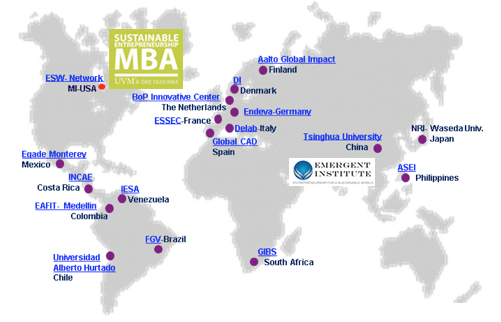For some time now I've been advocating ways for businesses, institutions, and individuals to heed the "Voice of the Planet." Indeed, the future depends on it. Here's what we said a while back:

How do profit-seeking companies listen to the Voice of the Planet? As my colleague, Sanjay Sharma and I suggest, start by drawing a clear distinction between "core" stakeholders--those visible and readily identifiable parties (like current customers and suppliers) with a stake in the firm's existing operations--and "fringe," or peripheral stakeholders. Core stakeholders encourage us only to continuously improve what we already do. Yet, answering the question of our time calls for disruptive, leapfrog innovation, which requires divergent thinking. This means reversing the traditional stakeholder management model by learning to actively engage previously excluded voices from the fringe-- the rural poor, urban slum dwellers, and advocates for nature's rights, just to name a few.
As I've explained before, the dominant model of business education and entrepreneurial development is broken.
Now, I'm happy to announce that I've joined forces with the University of Vermont to create a new Sustainable Entrepreneurship MBA program (SEMBA). In essence, we're doing something about the "saddlebag" approach to sustainability that has permeated academic world for so long. Together with my colleague and friend Dean Sanjay Sharma, who I first met more than 15 years ago, we're taking action on our article, "Beyond 'Saddle Bag' Sustainability for Business Education" (Organization & Environment). It chronicles the history of how business schools have incrementally added courses in sustainability, corporate social responsibility and ethics in response to evolving societal demands. What we're doing represents a bold new venture where a major university has sought to fundamentally reinvent business education and the MBA degree by addressing the environment, ethics, entrepreneurship, poverty and inequality.
SEMBA Director Willy Cats-Baril redesigned the traditional MBA program by focusing the new 45-hour credit program on sustainable business and entrepreneurship-focused curriculum. SEMBA consists of five modules: Foundations of Management; Building a Sustainable Enterprise; Managing Growth; Focusing on Sustainability; and a practicum on Sustainable Entrepreneurship in Action. We've called it the Sustainable Entrepreneurship MBA and, it's different - not an MBA-as-usual. Here's why:
Accelerated: A one year program designed to get students back out there, inventing or reinventing their BoP enterprise as soon as possible.
Vermont DNA: Learn from, and develop relationships with, leaders from a master class of sustainable enterprises, including Ben & Jerry's to Burton Snowboards, Cabot, Green Mountain Coffee Roasters and Seventh Generation.
Global Access: Students will enjoy access to business and entrepreneurs around the world through our connection to the BoP Global Network. The BoP Global Network includes Enterprise for a Sustainable World, India's Emergent Institute, and the BoP Global Network - a vibrant community of academics and practitioners in 18 countries that engage in knowledge creation and dissemination about the theory and practice of creating sustainable businesses at the base of the economic pyramid.
Real World Immersion: Do meaningful, high-impact work with international partners that have on-the-ground access in emerging markets and the developing world. For example you can spend your practicum experience in India working with our partner The Emergent Institute in Bangalore, India. You will also be working with the Office of Technology Commercialization to bring the latest clean technologies to market.
Cutting-Edge Thinking and Practice: You'll be interacting with some of the leading thinkers and doers in the field of sustainable enterprise including professor Stuart Hart, Gustave Speth, and the Dean of the school Sanjay Sharma among others.
Multi-disciplinary: We've designed a unique curriculum delivered by passionate faculty from our School of Business, Department of Community Development and Applied Economics, and nationally ranked Rubenstein School of Natural Resources as well as the Gund Institute and Vermont Law School
Affordable, High-Value Investment: We're offering substantial scholarships to increase accessibility and opportunity at UVM, a school Bloomberg BusinessWeek calls "a top school for high salary grads."
Our aim is to build a global, action-learning ecosystem, enabling us to develop the next generation of leaders who will build, disrupt, innovate and reinvent sustainable businesses and enterprises in a world that demands it.

Will you join us?